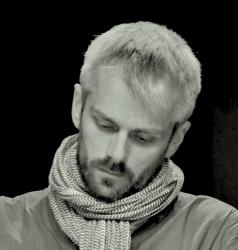Boy meets girl. How liberating can the formula be in 2005? Very. The film, titled Voksne mannesker in Danish (Grown-up People) but a tad more irritatingly Dark Horse in English, brought this particular viewer absolute cinematic joy, perhaps more so than any Icelandic director’s film before it.
“When you start speaking of A-taxes and B-taxes, my sight goes black and I want to die” are the approximate first words of the film, told by its hero, the slacker graffiti-artist Daniel, confronted with “grown-up” reality in a tax office.
We follow him and his Laurel&Hardy companion on to the point of meeting The Girl, with particular consequences upon which the hero acts. Sorry for the vague summary of the story, but it would be a shame to spoil this film with particulars.
The small, often tremendously comical situations, gestures and reactions that make up the film lead to a point where all the hero’s and viewer’s emotion and existential crises pour into the image of a car halted as a capsule bridge lifts, then recedes; at which point the viewer might, just might, lose all sense of self, observing the pure mechanic movement, wake up again and follow Daniel onto a bright new Tati future.
This film is a film, sure, but let’s contextualize. World cinema: This is a Pinocchio sort of love story, full of French New Wave, not merely stylistically but in spirit. The filmmaker says he’s “nodding his head” to a particular Godard film, but both Truffaut and Buñuel are just around the corner, as is Kieslowski in a parallel story running through half the film, Tati in the final scene, etc. – cinema history, however, does not become a burden here, it’s merely the etymology of a language the director quite fluently speaks.
In the context of Icelandic cinema in general, this film has liberating aspects. There are no mountains in it – none at all. In its production questions of nationality seem to have been considered as irrelevant as they are to the story told: a story of city-life. Only a decade ago, people’s main worry when Friðriksson’s highly recommendable Cold Fever was premiered, was that it displayed a distorted image of Iceland and its inhabitants. Cinema was given a representative role for state and nation. Perhaps Cold Fever was a pivotal point in that respect; ten years later, in any case, Dark Horse bears no such perverse burden, it is cinema.
As compared with Dagur Kári’s celebrated debut, Nói Albinói, Dark Horse involves the same subtle humour and eccentric out-of-place main character. But the film, as well as its main character, is more at ease with its eccentricities here, than was Nói. There is a tremendous lightness to this film, replacing both Nói’s claustrophobic isolation and the elegant but rigorous and sometimes over-conscious and stiff, frame designs.
Whereas Nói Albinói fulfilled expectations created by Dagur Kári’s short films, one is tempted to declare that finally Dagur Kári has exceeded them.
Voksne mannesker (Dark Horse) is showing at Háskólabíó, with an English-subtitled screening once a day.
Buy subscriptions, t-shirts and more from our shop right here!
















